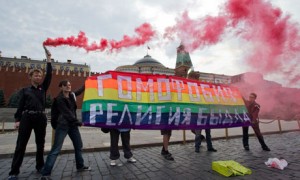Last summer, on June 30, Russian President Vladimir Putin signed into a law a piece of legislation banning the “propaganda of nontraditional sexual relations” in regions or areas exposed to minors. Article 6.21 reads as follows:
“Propaganda of nontraditional sexual relations among minors: 1. Propaganda of nontraditional sexual relations among minors expressed in distribution of information that is aimed at the formation among minors of nontraditional sexual attitudes, attractiveness of nontraditional sexual relations, misperceptions of the social equivalence of traditional and nontraditional sexual relations, or enforcing information about nontraditional sexual relations that evokes interest to such relations, if these actions do not constitute a criminal offence, – is punishable by an administrative fine for citizens in the amount of four thousand to five thousand rubles.”

This move sparked an outcry from activists and organizations both inside and outside of Russia. In the United States in particular, many urban bars and clubs began refusing to sell Russian vodka as a protest against the discrimination happening on the other side of the world. More public figures–Tilda Swinton, Cher, Madonna, Lady Gaga, Stephen Fry, and others–raised their voices in protest of Russia hosting an Olympic event meant to “unite the world.”
After calls for a boycott of the Sochi games seemed to fade into the background, attention turned instead to the Obama administration and whether or not the United States would make a statement regarding President Putin’s anti-LGBTQ stance. Months later President Obama’s office published the list of his hand-selected delegation to be sent to Sochi to represent the United State’s government. Topping the list were former Secretary of Homeland Security Janet Napolitano, Ambassador Michael McFaul, White House aide Rob Nabors, and two openly gay American Olympic Champions – two-time ice-hockey gold medalist Caitlin Cahow, and 1988 figure skating gold medalist Brian Boitano. In a recent interview Boitano informed USA Today, “Everyone knows why we’re here. We’ve made it obvious and quite public as to why Caitlin and I are supporting the delegation and are here. I think Russians know that and I think Americans know that and we’re proud to come from a country who supports tolerance and diversity and we stand strong.”
Since the Olympic Games began last week, other international athletes have voiced their opinions about Putin’s continued stance against gay rights in the face of Western opposition. “Homosexuality is not propaganda,” writes New Zealand Olympian Blake Skjellerup, “Anyone, no matter their sexuality, religion, or race, can play sports. One facet of who you are does not make you a weaker athlete. Being proud of who you are, and representing that makes you a stronger athlete, and the Olympic Games should be actioned in a place that provides that safety and opportunity.”
Putin, however, staunchly continues to defend the law he signed into effect. In his State of the Nation address this past December, two months before the opening ceremony in Sochi, Putin attacked the “norms of morality” of the West. “This destruction of traditional values from above not only entails negative consequences for society, but is also inherently anti-democratic because it is based on an abstract notion and runs counter to the will of the majority of people,” he said. As the games continue to unfold, it is predicted that athletes of multiple countries will pursue gestures of tolerance, bearing little regard for Putin’s disdain.
